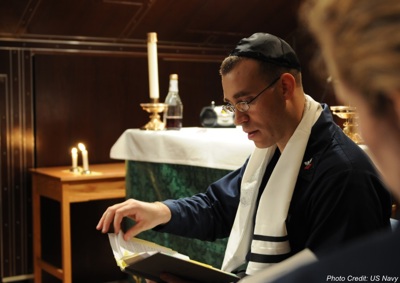The Culture Connection: Judaism at End-of-Life
This blog series is about various customs and practices that someone involved in end-of-life care might encounter. Now we look at the Jewish faith.
 The three largest Jewish denominations are Orthodox, Conservative and Reform. There are numerous smaller ones, too. This blog post isn’t exhaustive and doesn’t try to explain Judaism as a whole. As with all religions, it is impossible to do that in a brief format. Instead, I’d like to touch on some ideas and practices you may encounter with Jewish patients and families.
The three largest Jewish denominations are Orthodox, Conservative and Reform. There are numerous smaller ones, too. This blog post isn’t exhaustive and doesn’t try to explain Judaism as a whole. As with all religions, it is impossible to do that in a brief format. Instead, I’d like to touch on some ideas and practices you may encounter with Jewish patients and families.
Judaism has a rich tradition of honoring life and recognizing the inevitability of death. Judaism has many rituals and beliefs that give meaning and purpose to all aspects of a Jew’s life, from birth to death. These beliefs are important on a communal, familial and individual level.
You may meet Jews who have different takes on some of the practices described below. That’s why I encourage you to be open minded, ask your patients about their needs, support their way of practicing their religion and try to help them connect with their own faith community, rather than assume you know everything you need to know. Jews, like other people of faith, have a wide range of diversity within their faith. Generally speaking, these rituals and practices help a sick or dying person be aware that though they may feel alone and hopeless, there is a caring community of people who love and support them, and that God is with them during this time.
Please refer to the introduction to this blog series for some general advice.
Assisting another through death is an important way to express one’s faith, and the dying should not be left alone. There is a strong history in Judaism of visiting the sick and helping them maintain their dignity and comfort. The passage from life to death marks the conclusion of a Jew’s time on earth and the beginning of his/her eternal life in heaven, so this transition is a sacred time. Being aware of death (rather than avoiding the topic) helps someone live life more faithfully.
One prayer that a Jew might say for someone who is dying is from Psalm 121:
I lift my eyes to the mountains — from where will my help come?
My help will come from the Lord, Maker of heaven and earth.
He will not let your foot falter; your guardian does not slumber.
Indeed, the Guardian of Israel neither slumbers nor sleeps.
The Lord is your guardian; the Lord is your protective shade at your right hand.
The sun will not harm you by day, nor the moon by night.
The Lord will guard you from all evil; He will guard your soul.
The Lord will guard your going and your coming from now and for all time.
A prayer that can be used in many situations is from Numbers 6:24–26:
May God bless you and protect you.
May God deal kindly and graciously with you.
May God lift up his countenance towards you and
grant you peace.
Jewish tradition and belief places a high value on caring for the elderly. For much of history, this was done directly by the family at home, but many contemporary Jewish thinkers agree that a facility for the elderly is acceptable and sometimes preferable. This decision should be made out of love, honor and respect.
See if your area has a bikur holim, a committee of volunteers who support sick people and their families. It is usually part of a synagogue or other Jewish organization. They are trained to be sensitive to the needs of the sick.
Traditional Jews may perform a ritual called pidyon ha-nefesh — redemption of the soul. As part of this ritual, Jewish elders say prayers, study the Torah and collect money for charity on the sick person’s behalf.
If death is presumed to be near, and if a patient is mentally competent, Jewish tradition encourages them to reflect on their life, pass on wisdom, make amends if needed and say good-bye. The Vidui — Confessional Prayer Before Death — gives the dying person the chance to confess sins and ask for forgiveness.
Visiting those who cannot communicate well, such as dementia patients or patients in a coma, is highly valued. Jewish tradition recognizes that these situations are often awkward and uncomfortable but that a visitor can still minister to the patient with methods like music and prayer. Or one can simply hold the patient’s hand silently.
Jerry Gentry
Chaplain, Crossroads Hospice
Atlanta, Georgia
Please check back on Saturday when The Culture Connection: Judaism at End-of-Life will continue with a look at Jewish after-death traditions.
If you found this information helpful, please share it with your network and community.
Copyright © 2015 Crossroads Hospice. All rights reserved.




